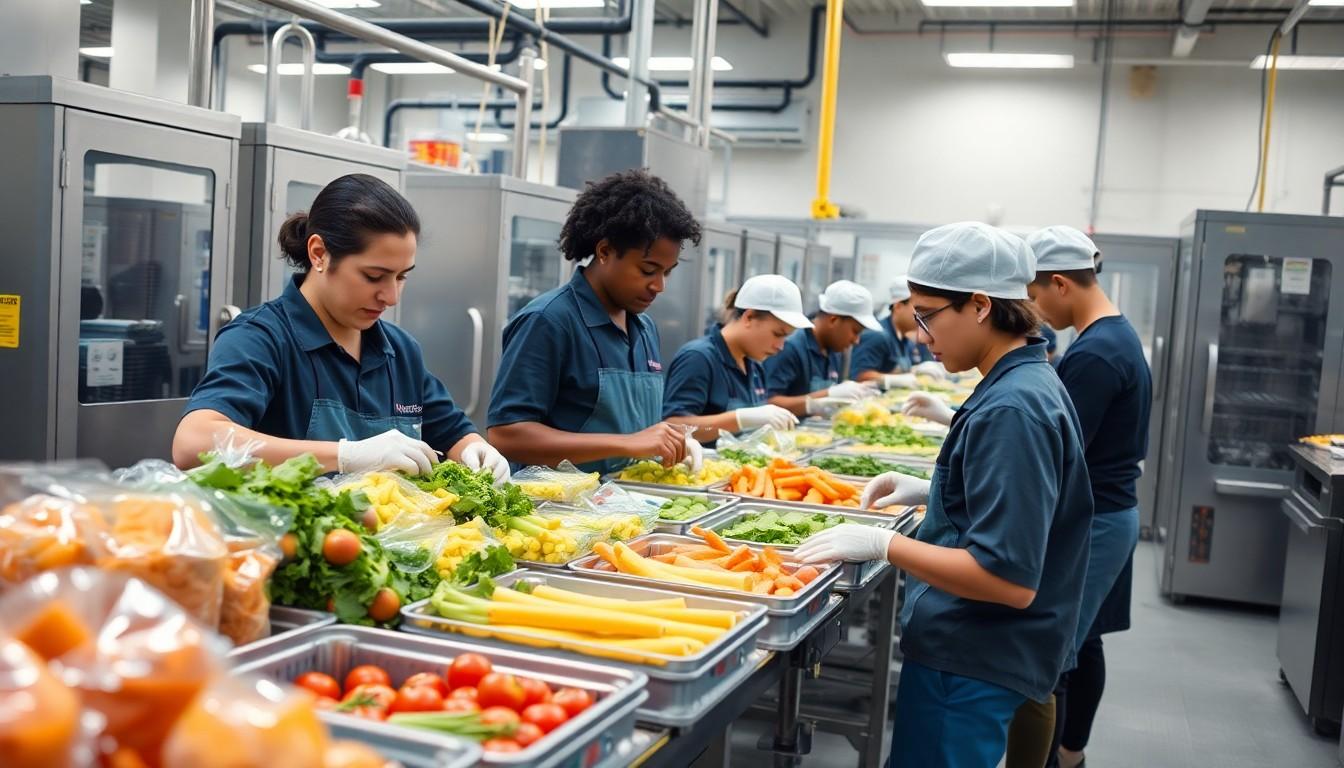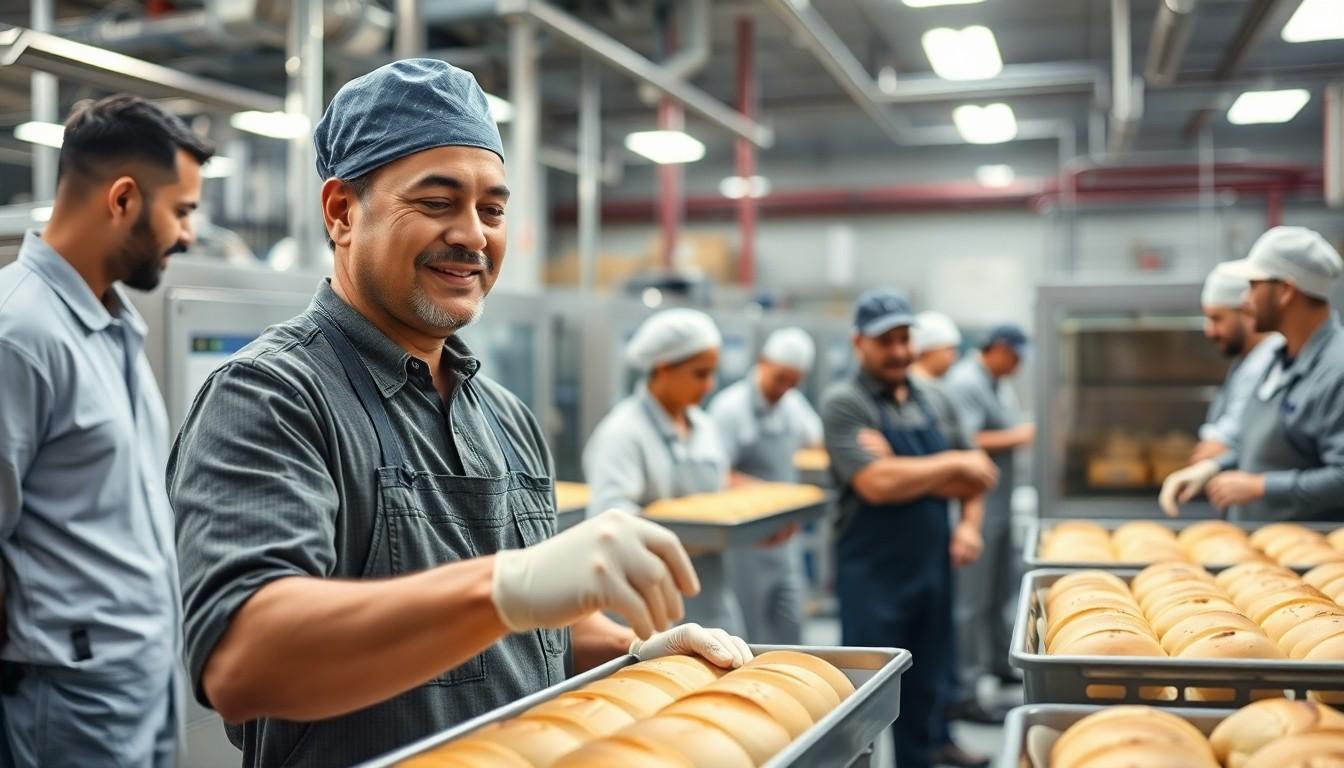In the bustling world of food and beverage manufacturing, creativity meets precision in a delicious dance. From the first whiff of freshly baked bread to the fizzy pop of a soda can, this industry serves up more than just meals—it crafts experiences that tantalize taste buds and spark joy.
Food And Beverage manufacturing
Food and beverage manufacturing encompasses a broad range of processes that transform raw ingredients into finished products. Producers utilize techniques such as mixing, cooking, packaging, and preservation to create items that meet consumer demands. The industry employs over 1.5 million workers in the United States alone, reflecting its significance in the economy.
Technological advancements play a critical role in this sector. Automation enhances efficiency while ensuring consistent quality across products. Quality control measures, including testing for contaminants and adherence to safety regulations, help maintain product integrity.
Sustainability practices are emerging trends. Many manufacturers are adopting eco-friendly methods, like using biodegradable packaging and reducing food waste. Data shows that over 60% of consumers prefer products with environmentally responsible attributes.
The market for organic and health-conscious products is expanding rapidly. Consumers increasingly seek healthier options, prompting manufacturers to innovate and reformulate existing products. Approximately 30% of U.S. households purchase organic food regularly, demonstrating a clear shift in buyer preferences.
Collaboration within the supply chain is vital. Manufacturers work closely with farmers and suppliers to ensure fresh ingredients are available. This partnership supports local economies while promoting transparent sourcing practices.
Food and beverage manufacturing is a dynamic field that blends creativity, technology, and sustainability. Innovations drive growth in the industry, meeting the evolving preferences of consumers while maintaining safety and quality standards.
Key Processes in Food and Beverage Manufacturing

Food and beverage manufacturing involves several core processes that ensure the production of quality products. Each of these processes plays a crucial role in delivering safe and enjoyable items to consumers.
Sourcing Raw Materials
Sourcing raw materials relies on strong relationships with farmers and suppliers. Many manufacturers prioritize partnerships with local growers to obtain fresh ingredients. Local sourcing supports community economies and ensures optimal quality. Seasonal availability often dictates ingredient choices, leading to a focus on freshness and flavor profiles. Sustainable practices also influence sourcing decisions, as many companies shift toward organic options. This approach aligns with consumer preferences for health-conscious products and environmentally friendly practices.
Production Techniques
Production techniques encompass various methods tailored to specific food and beverage items. Batch processing is common in smaller operations, allowing for greater flexibility and creativity. Continuous processing suits high-volume manufacturers, ensuring efficiency and speed in production. Technologies like automation streamline processes, leading to consistent results while minimizing labor costs. Innovative techniques, such as fermentation and cold brewing, enhance flavors and textures in products. Adopting new technologies and methods contributes to improved overall product quality.
Quality Control Measures
Quality control measures are essential for maintaining product safety and consistency. Regular testing throughout the manufacturing process identifies potential issues early. Standardized protocols ensure that food safety guidelines are followed rigorously. Training for employees on quality standards fosters a culture of accountability. Third-party inspections and certifications provide additional assurance of product integrity. Continuous improvement practices encourage ongoing evaluation and refinement of quality control measures, ultimately elevating consumer confidence.
Trends in Food and Beverage Manufacturing
The food and beverage manufacturing industry is evolving rapidly, shaped by emerging trends that enhance operations and meet consumer demands.
Sustainability Practices
Sustainability practices gain traction, with manufacturers adopting eco-friendly materials and processes. Biodegradable packaging stands out as a key preference for consumers seeking environmentally responsible options. Many companies focus on sourcing organic ingredients, emphasizing local partnerships to minimize environmental impact. Waste reduction initiatives also play a role, with manufacturers implementing strategies to minimize food waste throughout the production chain. Engaging in sustainable practices not only meets consumer expectations but also strengthens brand loyalty and market positioning.
Automation and Technology
Automation and technology are transforming production processes, increasing efficiency across the industry. Robotics streamline repetitive tasks, reducing labor costs while improving accuracy and speed. Advanced data analytics provides insight into consumer preferences and production efficiency, enabling manufacturers to optimize operations. Machine learning enhances quality control, allowing for real-time monitoring and immediate adjustments during production. Investing in these technologies positions manufacturers to excel, responding swiftly to market changes and ensuring consistent product quality.
Challenges in the Industry
Challenges in the food and beverage manufacturing industry pose significant difficulties. Supply chain issues often undermine efficiency, creating delays in acquiring raw materials. Manufacturers must forge strong partnerships with suppliers, as fluctuations in demand and climate-related disruptions can impact ingredient availability. Addressing these concerns requires transparency and real-time data sharing among all supply chain participants.
Regulatory compliance represents another challenge that manufacturers face. The necessity to adhere to local, state, and federal regulations can complicate production processes. Companies must implement rigorous quality control measures and maintain accurate documentation to ensure they meet safety standards. Navigating changes in food safety laws and labeling requirements demands constant vigilance and adaptability, as compliance is critical for maintaining consumer trust and avoiding potential penalties.
The food and beverage manufacturing industry stands at a pivotal point where creativity meets technological innovation. As manufacturers embrace sustainability and automation, they’re not just enhancing efficiency but also responding to a more health-conscious and environmentally aware consumer base. By prioritizing quality control and forging strong supplier relationships, the industry can navigate challenges while ensuring product integrity.
With a focus on emerging trends and a commitment to adapting to market demands, this sector is poised for continued growth. The blend of tradition and modernity will shape the future of food and beverage manufacturing, making it an exciting field to watch.

